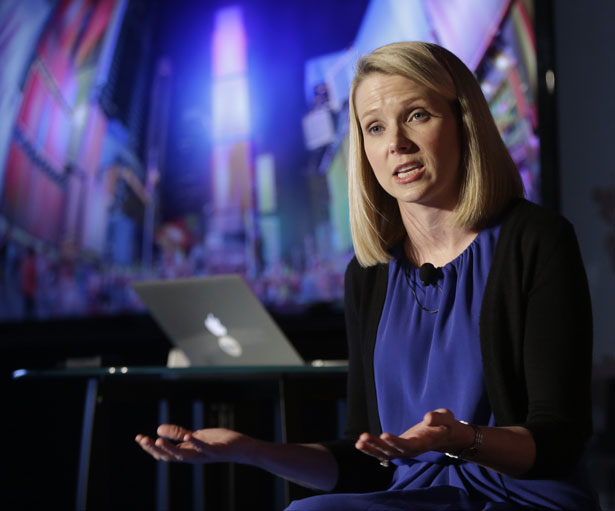
Yahoo CEO Marrissa Mayer speaks during a news conference Monday, May 20, 2013, in New York. (AP Photo/Frank Franklin II)
This story originally appeared at Truthdig. Robert Scheer is the author of The Great American Stickup: How Reagan Republicans and Clinton Democrats Enriched Wall Street While Mugging Main Street (Nation Books).
I have nothing against the folks who created Tumblr and managed to get Yahoo to bid a whopping $1.1 billion this week to buy the company. More power to them, I thought as I attended the event they helped sponsor Monday night for winners of this year’s Webby Awards, one of which—best political site—went to Truthdig, the online news magazine I proudly edit.
But as I mingled with my fellow honorees, there was a pang of concern that I would like to think is not driven by jealousy. Sites like ours, even when they are hooked to established news organizations, are starved for funding to pay for the journalism they provide. Others do spectacularly well, less because of the eyeballs they attract than for the personal information their readers freely give up that is desired by potential advertisers.
That is the appeal of Tumblr, a six-year-old social blogging service that has yet to earn much money because it has shunned advertising, thereby gaining the trust of its users who willingly share massive amounts of private data. Tumblr’s CEO told the Los Angeles Times in 2010 that he was “pretty opposed to advertising,” but Yahoo undoubtedly has other plans.
“Yahoo believes it could help Tumblr bring in more money by selling ads—boosting its own revenue in the process,” reported, citing Yahoo insiders. The model is one of data mining, exploiting the naive surrender of personal privacy so common on the Internet to better target advertising. As the Journal summarized it: “Data is at the heart of Yahoo’s ability to sell online advertising across its sites, based on what it knows about its people’s interests.”
This is an advertising model well understood by Yahoo CEO Marissa Mayer, who took over the troubled company last summer after thirteen years of exploiting such data at Google. The enormous success of Google, and the main model for business success on the Internet, is that of data mining. The societal cost of sorting through people’s most personal information with abandon is the end of the very notion of privacy so basic to the functioning of a democratic society.
That the very tools of data mining developed to track consumer habits could also be used to sustain totalitarian thought control was conceded in a recent book, “The New Digital Age,” by top Google execs Eric Schmidt and Jared Cohen.
“Despite the expense, everything a regime would need to build an incredibly intimidating digital police state—including software that facilitates data mining and real-time monitoring of citizens—is commercially available right now,” the two wrote in a Wall Street Journal article last month. “ … Companies that sell data-mining software, surveillance cameras and other products will flaunt their work with one government to attract new business. It’s the digital analog to arms sales. …”
Although Schmidt and Cohen aptly sound the alarm concerning the power of totalitarian rulers employing supercomputers to mine the vast troves of Internet stored data as a mechanism of control, they ignore the domestic parallel. Why restrict that worry to those with totalitarian intentions abroad? It is now established law that the various branches of government in our own country can all too easily access the data collected by commercial enterprises.
A generation high on the false intimacy of the Internet need no longer be coerced by government spooks to relinquish its privacy. Instead these folk readily allow others to trace their movements, purchases, reading and viewing practices as well as contacts with friends and associates. That is the data that Yahoo and rivals are so eager to mine, but they also expect to exploit that information with only the most cursory grant of permission from the customers furnishing it.
This business model would grind to a halt if a form of opt-in, as the European Union is now considering, was required before data supplied to one outlet, say Tumblr, was shared with other prying eyes, be they of corporate or government entities. As it is, sites such as Tumblr and Instagram became popular because they appeared to bestow a measure of privacy by not offering advertising. An aggressive ad program of the kind Yahoo needs to recoup its investment could fatally alienate Tumblr’s core constituency.
But shredding privacy is the essence of Tumblr’s appeal to Yahoo, and even though it has said it will retain the social networking site’s founders in key positions, one way or another that very personal data will be mined and inevitably fall into what users will discover to be the wrong hands. That is truly scary, for private space is the necessary incubator of personal freedom. Maybe we at Truthdig can win another Webby by writing about this.
Read Robert Scheer on Senator Elizabeth Warren taking on the big banks.


